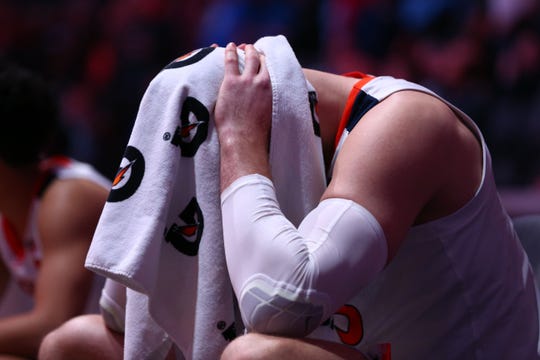CHARLOTTE — The look began to set in with about seven minutes to go. You know the look, the one that surfaces every spring with Virginia basketball when the system begins to break down, the scoreboard looks unfamiliar and a group of players that tore through the Atlantic Coast Conference season suddenly appear not to know what they’re supposed to do.
Maybe we’ll gather again in Minneapolis in three weeks and reassess Florida State 69, Virginia 59 in Friday’s ACC semifinals as a blessing for a team that perhaps needed a little adversity heading into the NCAA tournament.
But for now, it bears an all-too-familiar resemblance to every March meltdown that has belied Virginia’s ascent as one of the nation’s preeminent programs and casts unexpected doubt on whether this season will end any differently than all the others.
“We cut down the nets in the ACC tournament last year and didn’t like the way our season ended,” Cavaliers guard Ty Jerome said, referring to Virginia’s infamous loss to No. 16 seed UMBC in this exact same building. “This isn’t the end-all, be-all by any means. Just trying to figure out how much better we can get by next Thursday or Friday.”
Bubble Watch: Winners, losers among NCAA tournament fringe teams before Selection Sunday
It’s unlikely Virginia’s performance against the Seminoles will cost them a No. 1 seed. At 29-3 overall, with two losses to Duke and one to a top-15 team in Florida State, there’s almost no good argument for Virginia to drop.
At the same time, it wasn’t exactly an endorsement of the popular notion that this is Virginia’s best chance under Tony Bennett to make the Final Four and that this team’s elite-level offensive numbers would serve as a safeguard against an embarrassing early-round upset.
“When we’re right and we’re efficient offensively and hard to score against, we play at a very high level,” Bennett said. “These guys have been so sound and smart all year, but we also realize we’re susceptible as every team is in this tournament. Sometimes that’s valuable to know.”
Virginia Cavaliers center Jack Salt (33) sits on the bench prior to a game against the Florida State Seminoles. (Photo: Jeremy Brevard, USA TODAY Sports)
There is, perhaps, something to the idea that a loss during the conference tournament — particularly for a team that has had a relatively stress-free regular season — can be put to good use before it’s really win-or-go-home time. Only four of the last 10 national champions, in fact, won their conference tournaments, suggesting that a little extra rest and a touch of ornery is just as as effective in preparing for the NCAA tournament as cutting nets.
However, within the context of Bennett’s previous March résumé, watching this team struggle so badly Friday against Florida State’s roster of NBA-level athletes could only inspire anxiety and dread.
Over the last five years, Virginia is just 6-5 in the NCAA tournament despite being a No. 1 seed three times and a No. 2 seed once. Throw in the sport’s first-ever loss to a No. 16 seed and your program starts to get a reputation, even as the players change.
Often it’s mental. But with Virginia, it’s also physical.
As good as the Cavaliers are, they are not the team that wows you walking off the bus like a Duke or Kentucky or, yes, a Florida State. And when Virginia doesn’t have time and space to run its offense or get to the paint and it needs someone to just go do something, you can almost see the realization on the Cavavliers' faces that they just physically can’t.
In a tournament where talent transcends the deeper it goes, the burden of proof is on Virginia to show that its defense-first structure still matters when it needs a Plan B.
“They were the tougher team,” guard Kyle Guy said. “They were trying to penetrate and kickout and finish at the rim and they got to the paint a lot. We’ll watch the tape and be better from it.”
Part of what supposedly makes this Virginia team different is the presence of Guy, a tough-shot maker who can score it from anywhere, and a next-level athlete on the wing like Hunter, who got hurt in the ACC tournament last year and was sorely missed in the UMBC shocker.
But against Florida State, a team that can throw a bevy of 6-foot-9 and 6-foot-10 bodies onto the frontcourt along with several lanky wing defenders, Virginia struggled to finish at the rim and shot just 5-for-24 from the 3-point line. Guy’s effectiveness was all but erased in the second half, Hunter merely blended in and nobody had the ability to rise above what was happening and put some doubt into Florida State.
With about seven minutes left and trailing by double-digits, the cumulative effect of trying to score on all that length seemed to finally crack Virginia when Jerome and guard Kihei Clark both clanked layups off the bottom of the rim. And suddenly, though the opponent was vastly different, it started to look a whole lot like UMBC.
Now, Bennett has a week to make sure something like that doesn’t happen again.
“You take the hand that's dealt and you make the most of it,” he said. “I wanted these guys so bad to get a chance at a title fight, but that didn't happen. It wasn't that their effort was poor or anything, but now we'll use it to the best of our, or to our advantage.”
Regardless, Virginia enters March once again as a marked program. When the NCAA tournament field gets announced Sunday, every No. 2 or No. 3 seed will hope to land in the Cavaliers' bracket. Maybe this is the year that narrative will finally change, but Virginia offered no evidence in Charlotte that this NCAA tournament would end any differently for them from all the others.
Source: Read Full Article
